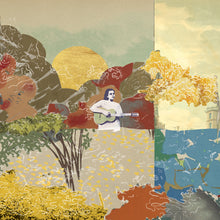In “The Sun Still Seems to Move,” Moser offers theological and existential musings — “I know that life’s not one linear seamless destination” — over fingerpicking and woodwinds, muscles and hands and breath. The music is thoughtful but determinedly physical. - The New York Times
Shannen Moser wants to have a conversation: with their past selves, their present self, their undesignated, unfurling future selves; with the trees that adorn their old street, and the door they used to call home; with the shadows of lovers-turned-to-friends and the overwhelming cacophony of abrupt change. They’re drawing a map but the port of call is cloudy and indistinct. It’s while traveling along these nebulous contours that their latest album The Sun Still Seems To Move forms a kind of physicality, of outstretched giving hands, that offers a guide through the fog. Here, Moser examines the disorientating, challenging task of trying to hold onto ourselves––and everything else––all at once. But this isn’t a fatalistic journey of melancholy or apprehension. Instead, Moser celebrates the small steps and the unwavering perseverance that makes it all worthwhile.
Moser’s previous albums Oh, My Heart (2017) and I’ll Sing (2018) were praised for their careful, intimate arrangements that showcased their sharp, interpersonal narration and time-less lush vocals. On The Sun Still Seems To Move, their first release in four years, Moser takes the arresting simplicity of their past LPs to form a malleable foundation, and combines it with orchestral swells and poignantly-rich harmonies.
The Sun Still Seems to Move is an album of reckoning with death and trauma, with all the shapes that love can take and all the people we’ve been and will become. It’s a record of regret and relief, unlocking every facet of feeling with an unabashed yet tender vigor. It’s watching the clouds bend to a new shape and still staying outside. It’s cry-laughing on the phone to an old friend, and trying to trust yourself again. By leaning into–and being at the whim–of this kind of vulnerability, Moser is able to navigate the spaces between the losses to produce a truly honest and lustral work. “Holding space for all of these feelings is confusing, but I think that’s what makes the world turn,” they explain. “It’s love and grief existing in tandem and it feels like this never ending, switch-ing one out for the other.




